Memoirs & Diaries - The Devil - My Friend
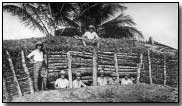 The first time we tried to
saddle him he sent two men to hospital. It wasn't viciousness: he
was young; he had never been backed before; he didn't understand.
The first time we tried to
saddle him he sent two men to hospital. It wasn't viciousness: he
was young; he had never been backed before; he didn't understand.
He only knew an unmolested life on a South African farm, and the sudden change upset him. The herding down to the coast and the long stifling sea voyage up to German East must have been unpleasantly strange.
He landed at a malarial little port called Kilwa Kissiwani, and, the day after, was handed over with a batch of remounts to an Indian cavalry regiment. He came to my squadron, and I picked him out as a charger because his head and ears, fine muzzle, and wide nostrils showed breeding.
My orderly christened him Shaitan (the Devil), mainly, I think, because the first thing the horse did was to bite him in the seat of the breeches.
He certainly was a devil at the beginning. His was the nervous kind of temperament one should have coaxed. But we hadn't time for that; we had to be ruthless. We had to throw him. All horses hate that, and he soon gave in. In three days he was ridable, and when, on the fourth, we started off, I took him as my charger.
The country was unlike anything I had seen before. In places we came across open grassland, but most of it was dense. Oppressive. It shut one in. One longed to push it all away and hold up one's head and breathe.
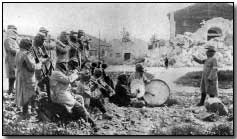 All around huge trees
towered up out of the ground, bent and twisted into grotesque shapes as they
fought each other for the space to live.
All around huge trees
towered up out of the ground, bent and twisted into grotesque shapes as they
fought each other for the space to live.
Here and there thin, gnarled branches hung down like the withered tentacles of some great forest octopus groping in the earth. Up above the canopy of leaves and inter-twining branches almost blotted out the sky.
One learnt, for the first time in one's life, to value water. Through those long weary days of striving Shaitan and I got to know each other, though he often did try to give me a nip in the seat of the breeches when I mounted. And he had a great heart. He never slacked. He never spared himself. He was always willing. When everyone else was worn out and weary, he'd hold up his eager head and stride along as if he never knew fatigue.
But the strain told. It was a very different Devil that stood beside me somewhere south of the Rufiji four months later.
We had had a hard day. A night without water or fodder, a long march round behind the German position to cut off the retreat, and some fighting. Late in the afternoon we were waiting to rejoin the column.
It was a remnant of the squadron that rested, the men silent, dirty, and dejected, the horses with drooping heads. Tunics were torn. Many men looked ill, with sunken eyes and thin, pinched faces. The horses were like skeletons.
Rawlins, the adjutant, had gone to find out where we were to camp, and we were waiting for him to come back. I felt dreadfully weary and sat down on the ground. Jackson came and sat beside me.
"Bedford is pretty bad," he
said.
"Really? I thought he was only hit on the arm?"
"Yes, but it's a ghastly hole. Must have been a soft-nosed bullet."
"Elephant, perhaps."
"Quite likely.... The sods!..."
For a while we sat silent. Behind us a man started spewing. I looked round. He was leaning up against a tree holding his stomach and being violently sick. The malaria there must have been a particularly virulent type; it seemed to knock the men out altogether.
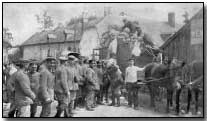 Jackson lay back and shut
his eyes. After awhile Rawlins returned and told us we were to camp
inside the old German perimeter.
Jackson lay back and shut
his eyes. After awhile Rawlins returned and told us we were to camp
inside the old German perimeter.
We marched in. The ground was undulating, and intersected here and there by deep trenches. A strong boma of twisted branches enclosed the whole position.
Most of the other units of the column were already in camp and several fires had been lighted, at which men were cooking. We led up the main centre road and turned off on to the site that we were to occupy.
As the men were putting up the long line from tree to tree to which head ropes are fastened, the C.O. came over and spoke to me, and Rawlins joined us.
"I've just seen Colonel
Stone, sir. He says we can't water to-night."
"Can't water! But that's preposterous!"
"I know, sir. I told him. I--"
"But-- Good Lord! Doesn't he realize we were out on the flank last night? He
must be mad. I'll go and see him myself."
He hurried off towards the Column Headquarters tent. Rawlins shook his head.
"It won't do any good," he
said glumly.
"But 'C' Squadron has had practically no water for thirty-six hours," I
protested.
"I know. But I don't think we shall get any. It isn't that Stone
doesn't realize. He was quite upset about it. But apparently
there are 3,000 porters who haven't had water yet."
The C.O. came back. If we must have water we could clear the water-hole, but we should probably have to use bayonets.
"Which sounds ridiculous, doesn't it?" he said. "You'd better go and see what is happening there, Rawlins."
I went along with Rawlins. We found out from a gunner that the water-hole was behind a low ridge, which he pointed out at the far comer of the camp.
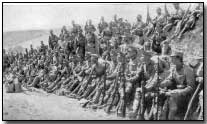 As we approached we heard
an incessant babel, quite distinct above the hum of the camp noises.
It grew louder as we got nearer. We found ourselves in a jostling mob
of porters.
As we approached we heard
an incessant babel, quite distinct above the hum of the camp noises.
It grew louder as we got nearer. We found ourselves in a jostling mob
of porters.
The crowd of them on the road was so dense that it was impossible to force one's way along. We climbed up on to the low ridge and looked over.
The ground in front of us was alive - a great crawling mass of black heads and khaki bodies, pushing and struggling, like maggots crowding about a rotting carcass.
No water-hole was visible, only a sea of moving bodies. In the dusk it looked like a huge heaving blanket and one could hardly realize it was composed of human beings - porters mad with thirst.
In the middle of the mass an arm would stretch up, the hand holding a chaghul. Immediately a dozen arms would snatch at it, pulling and jerking until the water spilt down on upturned faces with mouths gaping open to catch the splashes.
Those in the centre must have been standing in water up to their thighs, while those at the edge stood in mud, but their bodies were packed so tightly together they could hardly bend down.
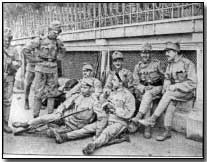 I saw a man struggling to
get out. In one hand he held his dripping water bottle pressed to his
body, with his other hand he shoved and pushed the bodies near him.
I saw a man struggling to
get out. In one hand he held his dripping water bottle pressed to his
body, with his other hand he shoved and pushed the bodies near him.
He heaved and writhed, but he hardly moved a yard. Then his arm got wedged, and another man grabbed the bottle and drank. The first man tried to wrench it back, beating the other's face, but he went on drinking even though his nose was torn.
As we watched, I believe a man was trampled into the mud. His body was down amongst a mass of legs. I couldn't see properly what happened, but it looked as if they just stamped on him. It was impossible to do anything.
We came away. It was not an edifying sight. To water the horses that evening was obviously out of the question, so when I went along to Shaitan I took my water bottle.
He looked round when he heard me coming and gave a low whinney, as he always did, pushing his soft velvety muzzle into my hand when I went up to pat him. I pulled his ear. Usually he pretended he didn't like it and gave a playful nip at my leg, but to-night he was too utterly weary to play. He just rubbed his nose against me.
I took up my water bottle and, while my orderly held up Shaitan's head, I pulled out his lip and poured a little water into his mouth. Poor old thing, he got so excited. I could feel him trembling. I'm not sure it was a kindness really; I could only spare such a very little and he was so frantically thirsty.
And the smell of it made the horses near him restless. But they quietened down after a bit, and then I gave him his dope - a sprinkle of white powder on a handful of grain. Arsenic.
We dosed all the horses with it every night because we were in a tsetse belt, and it was supposed to be a prophylactic for "horse sickness." But I doubt if it really did much good. They looked dreadful, poor brutes; their withers and hip bones stuck right out, and the flesh had fallen away from their backs, leaving backbones standing up like ridges.
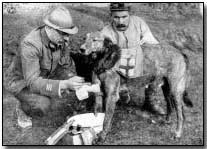 Of course the fatigue, the
lack of fodder, and the long spells without water had a lot to do with it,
but it was the "sickness" that made them seem to fade away.
Of course the fatigue, the
lack of fodder, and the long spells without water had a lot to do with it,
but it was the "sickness" that made them seem to fade away.
I went back and sat down on my valise. Brent was opening a tin of melon jam by the light of our hurricane lamp, turned very low because we had no spare oil.
I got my tin of bully beef and started to eat, scooping it out with a pocket knife. I expect it tasted rather tinny, it usually did, and possibly it was a bit mouldy, but one didn't notice that in the dark.
We were very low in food just then: bully beef, jam, and ration biscuits - the latter so hard that one had to saw off pieces with a knife because one couldn't bite them. And we were nearly always hungry - so hungry that if anybody took a little more than his share of jam it made the rest of us angry.
I can see that scene now: Around us the dim forms of the horses, the trees, the camp fires flickering out of the darkness. Jackson stretched on his back with his eyes shut; Brent beside him munching.
On the ground the lamp, burning in that absolutely still air without a flicker, showed dimly their sweat-stiff shirts, their cropped heads, their scrubby beards, and the hollows on their dirty faces. It made them look like Russian prisoners.
As we ate, a noise in the bushes behind made me look round. Two figures were moving slowly through the undergrowth beyond our light.
"Kaun hai (Who's there)?" I
called out.
"Do admi aur ek mard."
Two men and one corpse. I don't know who they were, I suppose they were trying to find some spot where, undisturbed, they could perform the last rites for a brother killed in the attack. Nobody seemed to heed them. We went on eating.
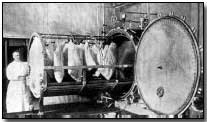 When we had finished we put
up our mosquito nets. Jackson had thrown his away, but Brent and I
still had ours.
When we had finished we put
up our mosquito nets. Jackson had thrown his away, but Brent and I
still had ours.
They were small - just big enough to lie under - and dyed a dark brown. We tied the four top corners to sticks stuck in the earth. Brent's was quite good, but mine was torn and full of holes.
It didn't keep out the mosquitoes, but I imagined it kept out the horrid things that slid to and fro in the undergrowth - snakes, scorpions, centipedes, and huge warrior ants. In the dark one never knew that they were not creeping about over one's body. They did sometimes. Once in the middle of the night something slimy crawled over my throat.
Jackson had a high temperature that evening. He took fifteen grains of quinine, and Brent gave him some aspirin, but it didn't seem to ease him much, because I heard his teeth chattering as we lay there in the dark. I got up and collected a couple of horse blankets and wrapped them round him. He looked worse next morning.
I told him he'd better report sick, but he tried to make out it was nothing.
"Only one of my goes of fever, old thing. I'll be all right in a couple of days."
But I fetched Doc. And Doc shook his head. He sent Jackson down the line straight away by the empty ration convoy that left before we marched. Poor Jackson. He was the kind who never gives in, but the beastly country got him down in the end. He seemed awfully weak when we said good-bye. I felt it was unlikely that I would see him again.
I wasn't feeling too great myself. As I was thinking about opening my bully beef, I felt a pain in my stomach; a sharp gnawing pain. I knew what that meant. I'd had dysentery twice already. I decided to give meat a miss for a day or two.
"It's an ill wind--" Brent philosophically remarked when I gave him my ration.
Shaitan got water all right, though it was very muddy. But he had a fairly easy day in front of him, as we only had to march fifteen miles to join another column.
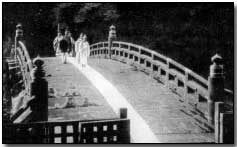 The Intelligence Officer
attached to my squadron came along as we were forming up - a lean,
dark-skinned fellow called Van Ponk, a Dutchman, with a scar across his left
cheek which was the result of a bullet wound he received fighting against us
in the Boer War.
The Intelligence Officer
attached to my squadron came along as we were forming up - a lean,
dark-skinned fellow called Van Ponk, a Dutchman, with a scar across his left
cheek which was the result of a bullet wound he received fighting against us
in the Boer War.
He had collected a couple of local bush inhabitants to act as our guides, and I found them waiting at the corner of the camp as we moved out. They were a comic couple; a thin wiry old man with curly iron-grey hair and a young boy.
The boy was naked except for a strip of the fibrous bark of a tree wrapped round his middle, but the old man was more dressy. He had a two-piece suit made out of a couple of grain sacks. He'd cut holes for his legs in one, which was pulled up and fastened round his waist with a thong, and the other had holes cut for head and arms, and was worn like a shirt.
It might have been quite an effective shirt, but, unfortunately, he had only been able to get hold of a very small sack, so it looked like a very coarse little brown vest that had shrunk in the wash. Rawlins grinned at me as we started off.
"If in doubt," he said, "rely on the fellow in the plus fives."
At first the air was fresh, almost cold, but as the sun got up it became hot, and one's skin dried up as if there was no moisture in one's body at all. Those hot, dry marches always made me long for wet pavements. I used to picture Piccadilly in the evening when it was drizzling, with all the lights reflected in the wet.
The bush we went through varied: sometimes it was more or less open, like a thickly tree'd park; sometimes the undergrowth was so thick the flankers could not keep in touch; sometimes the path led through a dense forest of bamboos. Never could one see more than 100 yards ahead.
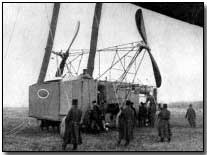 It was like playing a
fierce, relentless game of hide-and-seek in a strange garden in the dark.
It was like playing a
fierce, relentless game of hide-and-seek in a strange garden in the dark.
And though one might march from dawn to dusk without meeting any enemy at all, without even hearing a shot fired, one was utterly worn out with the mental strain of it at the end. One's mind could never relax.
After we had been marching for four hours or so, we got on to a road down which a squadron had raided a few weeks previously. One couldn't help knowing it. The dead-horse smell was nauseating. It made Brent sick. Several were lying quite near the road, their legs sticking straight up in the air, their bodies swollen like balloons. The stench was quite awful. Thank goodness it only lasted for about a mile!
Shaitan began to get very sluggish. I had to keep urging him on, a thing I had never had to do before. I guessed he must be feeling pretty rotten, because, though for the last three weeks I'd missed the eager springing step of old, he had never slacked. Worn out as I knew he must have been at times, that great spirit of his would never let him rest.
Today I hated riding him. It was cruel having to urge when I could feel the effort it was to him to keep going, and I knew how bravely he was trying.
Twice he stumbled badly, and at the second time I called up my orderly and told him to bring me one of the spare horses at the next halt.
"Old Shaitan's tired out," I said. "We'll give him a rest." But the rest came sooner.
A few minutes before we were due to halt he suddenly stopped, turned off the path, walked a few paces, and stood still. And then he sank. I only just had time to slip off before he collapsed. We got his girth undone and pulled the saddle away and slipped the bit out of his mouth. And he lay there on his side, a poor worn shadow of what he used to be.
I rubbed the velvet muzzle gently with my knuckles, I pulled an ear that was cold and damp with sweat... and said goodbye to him.
There was nothing else for it. I brushed aside a wisp of forelock and put my revolver to his temple - and shot him.
Captain C. H. Trehane entered the Army from Sandhurst in 1912. Attached 2nd King's Regt. and 8th Hussars, and joined 25th Cavalry (Frontier Force), I.A., in 1913. 1914-1915, operations at Miramshah, North-West Frontier; 1917, German East Africa; 1918, Mesopotamia and Persia (attached 5th Cavalry). Eventually invalided from the service.
First published in Everyman at War (1930), edited by C. B. Purdom.
Photographs courtesy of Photos of the Great War website.
A "chit" was British slang for a piece of paper.
- Did you know?
